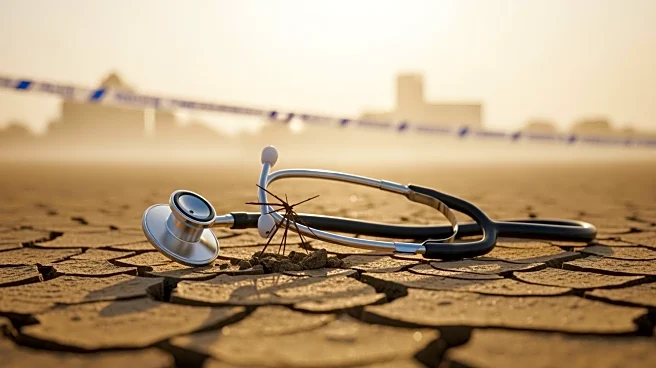What's Happening?
The World Health Organization (WHO) Director-General, Dr. Tedros Adhanom Ghebreyesus, has issued a stark warning about the enduring health crisis in Gaza, describing it as a 'catastrophe' that will persist for generations. Despite a ceasefire brokered
by the United States between Israel and Hamas, the flow of aid into Gaza remains insufficient to address the severe healthcare needs of its population. The ceasefire, part of a 20-point peace plan, aims to increase aid distribution without interference. However, Dr. Tedros noted that the aid levels are below what is necessary to rebuild Gaza's healthcare system, which has been devastated by famine, injuries, and disease outbreaks due to damaged water and sanitation infrastructure. The WHO chief emphasized the need for unrestricted humanitarian aid access and criticized the weaponization of aid, urging Israel to remove conditions on aid delivery.
Why It's Important?
The ongoing health crisis in Gaza has significant implications for regional stability and humanitarian efforts. The inadequate aid flow exacerbates the suffering of Gazans, who face overwhelming injuries and a collapsed healthcare system. The situation highlights the challenges of delivering humanitarian aid in conflict zones and the need for international cooperation to ensure aid reaches those in need. The crisis also underscores the importance of sustainable peace efforts, as the current ceasefire remains fragile. The U.S., having brokered the ceasefire, plays a crucial role in ensuring compliance and facilitating aid delivery. The long-term health impacts in Gaza could affect regional dynamics, potentially influencing political and humanitarian policies.
What's Next?
The WHO and other international organizations are likely to continue advocating for increased aid access and the removal of restrictions on humanitarian deliveries. The U.S. may face pressure to enforce the terms of the ceasefire and ensure that aid flows into Gaza without conditions. Israel's response to these calls will be critical in determining the effectiveness of the ceasefire and the rebuilding of Gaza's healthcare system. The international community may also explore additional diplomatic measures to stabilize the region and support reconstruction efforts. Monitoring the situation closely will be essential to address the humanitarian needs and prevent further deterioration of the health crisis.
Beyond the Headlines
The health crisis in Gaza raises ethical questions about the responsibilities of conflicting parties in ensuring humanitarian aid access. The weaponization of aid and the conditions imposed on its delivery highlight the complex interplay between military actions and humanitarian needs. The situation also reflects broader issues of international law and human rights, as the health and well-being of civilians are caught in the crossfire of geopolitical conflicts. Long-term solutions will require addressing these ethical and legal dimensions, alongside efforts to rebuild Gaza's infrastructure and healthcare system.














